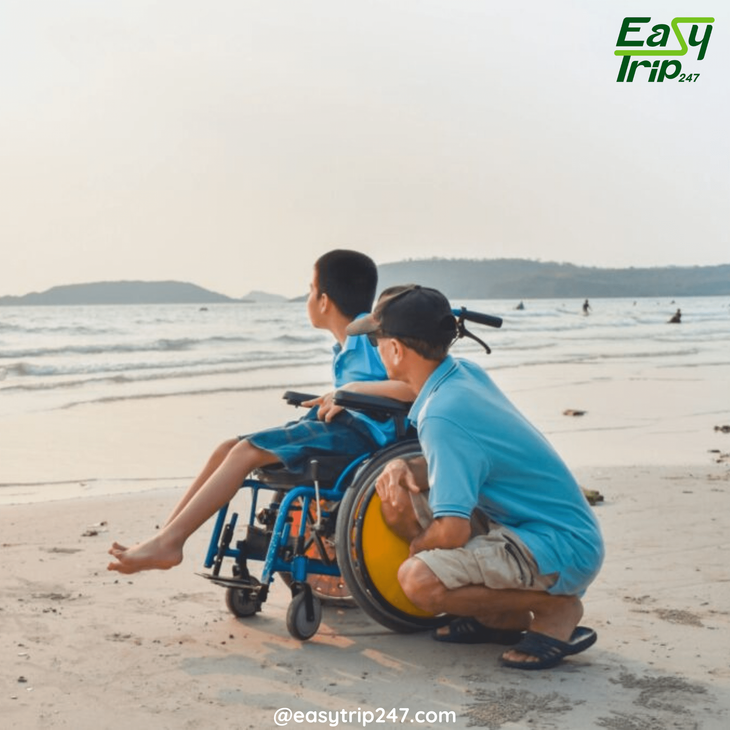Family vacations for special needs children
On
23/06/2025Reading time:
1 min
Summary:
Planning family vacations can be one of the most enriching and rewarding experiences for any household, but for families with special needs children, that journey takes on even greater significance. The opportunity to relax, bond, and explore the world together is invaluable—but it requires thoughtful consideration, inclusive services, and accessible destinations.

Vietnam’s gentle, family-oriented culture is one of its strongest assets when it comes to family vacations involving special needs children. Across the country, from large cities to small coastal villages, people are generally warm, patient, and eager to help. For many families, this hospitality alone can ease the natural anxiety that often accompanies international travel. Unlike destinations where unfamiliar stares or lack of understanding may cause stress, Vietnam offers a genuine sense of acceptance. Whether you're visiting a traditional market in Hanoi or a floating village in the Mekong Delta, the human connection makes these family vacations feel safe, supported, and culturally enriching.
One of the best cities in Vietnam for accessible family vacations is Da Nang. With its wide, wheelchair-friendly sidewalks, clean beaches, and calm pace of life, Da Nang stands out as a welcoming haven for families with special needs children. The beachfront resorts here, such as Furama and Hyatt Regency, have invested in accessible infrastructure, sensory-friendly environments, and staff training. Many offer services like in-room dining, quiet zones, and private pools—perfect for creating a controlled and comforting space during your family vacations. Moreover, Da Nang’s moderate climate and lack of overwhelming crowds make it especially suitable for children who might be sensitive to overstimulation.
Just south of Da Nang lies the picturesque ancient town of Hoi An—another fantastic stop for inclusive family vacations in Vietnam. The car-free Old Town, lined with lantern-lit streets and tranquil riverside paths, creates a soothing environment that is both stimulating and gentle. Activities such as lantern-making workshops, private boat rides on the Thu Bon River, or visits to sensory-friendly cafés allow children to engage at their own pace. Many local tour operators now offer private guides trained to work with families who have specific accessibility or behavioral needs, ensuring that your itinerary is flexible, stress-free, and enjoyable for every member of the family.
Another destination worth highlighting for family vacations in Vietnam is Nha Trang. Known for its relaxing beachfront atmosphere and wellness culture, Nha Trang is home to several inclusive resorts that offer spa treatments, adaptive activities, and calm play areas tailored to children with special needs. The beach itself features shallow, calm water and less foot traffic compared to more tourist-heavy areas, making it ideal for those who need a quieter environment. Several resorts, including Amiana Resort and Mia Resort, offer autism-aware staff, food customization for dietary needs, and programs that include gentle physical activities like sand play, swimming, and nature walks. For families planning longer family vacations, this peaceful setting is often a highlight.
Inland, Da Lat presents another option for sensory-friendly family vacations. Located in the highlands, this city’s cooler climate, pine forests, and slow pace make it a refreshing break from the tropical heat and urban noise. Walking around Xuan Huong Lake, visiting strawberry farms, or taking a quiet cable car ride over pine-covered valleys provides light stimulation without being overwhelming. Resorts like Ana Mandara Villas offer large, quiet rooms and customizable meal options, ideal for families managing sensory processing issues or feeding challenges. Da Lat’s accessibility and lower altitude also make it a good choice for families concerned about temperature sensitivity and sensory overload during family vacations.
Vietnam’s growing network of inclusive travel services is also making a significant difference. More tour companies now recognize the unique requirements of special needs travelers and provide services accordingly—from customized transportation and sensory-aware guides to inclusive excursions that prioritize comfort and safety. Private transportation options are often the best choice for family vacations involving special needs children, offering the flexibility to adapt schedules, avoid crowds, and create a more predictable routine. With a bit of pre-travel coordination, you can secure vehicles that support wheelchair access or carry special equipment like medical gear, noise-canceling devices, or visual aids.
Additionally, Vietnamese cuisine offers a surprising level of flexibility for children with dietary restrictions—a common consideration in family vacations with special needs in mind. Most restaurants are willing to accommodate special requests, and allergy-friendly foods like plain rice, grilled meats, fresh fruit, and steamed vegetables are widely available. For children with sensory-based food preferences or intolerances, this adaptability can help reduce mealtime stress and enhance the overall travel experience.
Another underappreciated aspect of Vietnam’s suitability for family vacations is its growing commitment to educational tourism. Museums such as the Vietnam Museum of Ethnology in Hanoi and the Ao Dai Museum in Ho Chi Minh City are quiet, spacious, and ideal for private tours that allow for slower-paced exploration. Some centers also offer tactile exhibits, low-light spaces, and interactive activities suited for children who thrive with hands-on learning experiences. These educational moments help add depth and value to family vacations, creating not just leisure, but genuine learning and cultural appreciation.
Furthermore, Vietnam is home to several NGOs and community organizations that provide therapy support, inclusive art programs, and respite care, particularly in major cities like Ho Chi Minh City and Hanoi. Some families even choose to integrate therapeutic activities like equine therapy or art workshops into their family vacations, blending relaxation with progress in developmental goals. While still a growing sector, these services represent a positive shift toward inclusive tourism and demonstrate that Vietnam is not only welcoming but evolving to meet the needs of all families.
Planning family vacations for special needs children in Vietnam does require some extra steps—such as communicating needs to hotels in advance, researching medical support in each city, and building flexibility into your itinerary—but the payoff is enormous. The country offers a beautiful combination of natural wonder, cultural richness, and human kindness that can help families not just travel, but truly thrive together. Whether it’s the stillness of Da Lat’s lakes, the laughter shared over lantern-making in Hoi An, or a quiet sunrise walk on My Khe Beach, these moments become the building blocks of unforgettable memories.
In conclusion, Vietnam is a rising star in the world of inclusive travel and has all the right elements to support beautiful, thoughtful family vacations for special needs children. The warm-hearted culture, expanding infrastructure, and flexible tourism options allow families to explore with confidence and comfort. As awareness continues to grow, so does the possibility for every child, regardless of ability, to experience the magic of travel. So if you’re planning your next trip, consider Vietnam not just as a destination, but as a place where your entire family—including your exceptional child—can feel seen, supported, and inspired. With the right preparation, Vietnam can transform your idea of what family vacations can truly be.
Design Your Tour Today And Get A Quote. Contact Us Here: +84.975.504.825
Source: Easytrip247 Team compiled.
